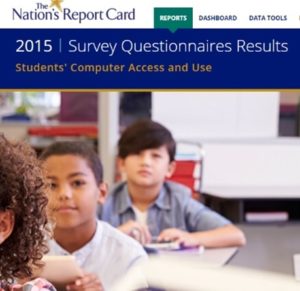 (2018) | Useful to Parent Centers in planning their outreach, dissemination, and training efforts.
(2018) | Useful to Parent Centers in planning their outreach, dissemination, and training efforts.
Most students had access to a computer at home or in school in 2015. Across states and jurisdictions, access to computers at home ranged from 77% to 97% for students in 8th grade, while access to computers in school ranged from 78-100%. Students without computer access at home tended to perform worse on National Assessment of Educational Progress (NAEP) assessments in 2015.
The National Center for Education Statistics released this report titled, 2015 Survey Questionnaires Results: Students’ Computer Access and Use. The report is second in a series of reports that examine 2015 survey questionnaire and achievement data from the NAEP.
The report takes an in-depth look at students’ access to computers at home and in school, and students’ use of computers for classroom learning at grades 4, 8, and 12. Associations between students’ computer access and use and student performance on the 2015 NAEP mathematics and reading assessments are examined at the national level, across states and jurisdictions, and across large urban districts.
Key findings from the report include:
Computer access is divided along socioeconomic lines. Smaller percentages of lower income students reported having computer access at home in comparison to middle-to-higher income students.
Lower- and higher-performing students differ in how often they use computers for practicing and building academic skills in the classroom.
Computer use once or twice a week increased by as much as 5 percentage points in mathematics classes and 6 percentage points in reading classes between 2013 and 2015.
To view the full web report, please visit: https://www.nationsreportcard.gov/sq_computer/

